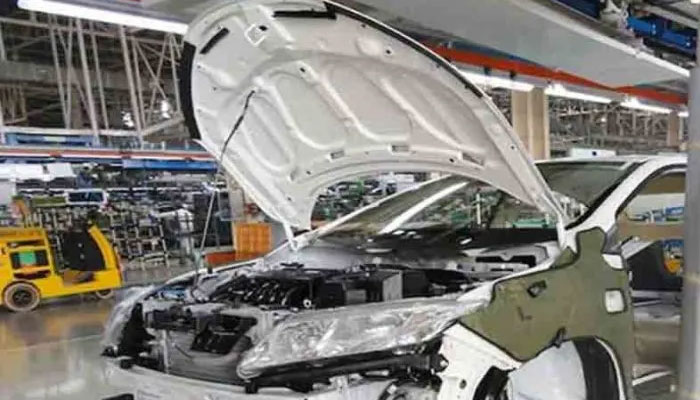Why doesn’t the auto industry localise?
KARACHI: As the auto industry jacks up the price of cars again, experts and analysts say the government must ensure higher localisation in order to prevent prices going up every time the exchange rate goes up.
Industry experts concur on one point. Localisation is the only way for the industry to keep car prices stable.
Last week, almost all car companies raised car prices between 5 percent and 15 percent, according to AHL Research Analyst Arsalan Hanif. Pak Suzuki, which mainly operates in the small-engine sized cars, jacked up prices by an average of 14 percent.
Indus Motor Company increased Toyota car prices by 6 percent; Honda Atlas 7 percent and Lucky Motor Company raised Kia car prices by 10 percent.
Since January 2018, car prices have gone up between 27 percent and 68 percent.
Suzuki Wagon-R price went up 54 percent, while Honda Civic Turbo has become 68 percent more expensive in less than four years. Toyota Fortuner’s price increased 58 percent during the same year. Meanwhile, the rupee has depreciated 58 percent against the dollar since January 2018 – moving up from Rs110.5 to Rs174.5.
Reasons given for this change in prices are; increase in international raw material costs, continuously changing forex rates, and increase in freight charges.
The industry depends on few affiliated industries such as steel and plastic raisins, which are mostly imported by the auto industry or its vendors.
“We don’t produce auto-grade steel in Pakistan,” an auto industry expert and former Pakistan Association of Automotive Parts and Accessories Manufacturers (PAAPAM) Chairman Mashood Khan said. “We also import plastic raisins to produce auto parts.”
Khan, who runs an auto parts manufacturing unit, said that auto imports might not come down unless Pakistan was able to manufacture auto-grade steel and plastic raisins.
“I think for this, the government must enable these affiliated industries to start production. These industries would not only provide raw material to the auto industry, but they would also provide raw material to other industries as well,” he added.
Apart from these reasons, the car companies also put blame on economic instability, lack of good, long-term and sustainable policies for everyone, increase in utilities and also increase in cost of production such as higher wages etc for rising car prices.
“I don’t think there is any other way to keep car prices stable apart from increasing localisation,” Arsalan Hanif of AHL said. On an average, 60 percent of a car in Pakistan is dependent on imported car parts, he added.
Khan said some cars derived 95 percent of the cost from imported parts and so were highly dependent on exchange rates. However, even developed countries were facing price surge in the auto industry of their respective countries because of the way things panned out due to the coronavirus pandemic.
“It has now been understood by the auto industry around the world that localisation is the way forward since the shipping lines choked and industry supply chain disrupted,” he explained. On the contrary All Pakistan Motor Dealer Association Chairman HM Shahzad said that auto industry’s localisation has been restricted by the foreign partners of the car companies in Pakistan.
“How will they let the companies localise when they want to increase their topline and bottomline by selling CKDs and SKDs to countries like Pakistan. They won’t let this happen,” said Shahzad.
However, car companies reject this notion without coming on record.
Mashood Khan said the government needed to increase regulatory duties and other tariffs for the auto industry to reduce auto part imports, while also giving a cushion to auto parts manufacturers and also a business case to the steel and plastic industries, so they manufacture raw material for the auto industry.
He said that apart from the auto industry, the parts manufacturers also depended on 30 percent to 65 percent of imported raw material to produce car parts.
-
 18-month Old On Life-saving Medication Returned To ICE Detention
18-month Old On Life-saving Medication Returned To ICE Detention -
 Cardi B Says THIS About Bad Bunny's Grammy Statement
Cardi B Says THIS About Bad Bunny's Grammy Statement -
 Major Hollywood Stars Descend On 2026 Super Bowl's Exclusive Party
Major Hollywood Stars Descend On 2026 Super Bowl's Exclusive Party -
 Sarah Ferguson's Silence A 'weakness Or Strategy'
Sarah Ferguson's Silence A 'weakness Or Strategy' -
 Garrett Morris Raves About His '2 Broke Girls' Co-star Jennifer Coolidge
Garrett Morris Raves About His '2 Broke Girls' Co-star Jennifer Coolidge -
 Winter Olympics 2026: When & Where To Watch The Iconic Ice Dance ?
Winter Olympics 2026: When & Where To Watch The Iconic Ice Dance ? -
 Melissa Joan Hart Reflects On Social Challenges As A Child Actor
Melissa Joan Hart Reflects On Social Challenges As A Child Actor -
 'Gossip Girl' Star Reveals Why She'll Never Return To Acting
'Gossip Girl' Star Reveals Why She'll Never Return To Acting -
 Chicago Child, 8, Dead After 'months Of Abuse, Starvation', Two Arrested
Chicago Child, 8, Dead After 'months Of Abuse, Starvation', Two Arrested -
 Travis Kelce's True Feelings About Taylor Swift's Pal Ryan Reynolds Revealed
Travis Kelce's True Feelings About Taylor Swift's Pal Ryan Reynolds Revealed -
 Michael Keaton Recalls Working With Catherine O'Hara In 'Beetlejuice'
Michael Keaton Recalls Working With Catherine O'Hara In 'Beetlejuice' -
 King Charles, Princess Anne, Prince Edward Still Shield Andrew From Police
King Charles, Princess Anne, Prince Edward Still Shield Andrew From Police -
 Anthropic Targets OpenAI Ads With New Claude Homepage Messaging
Anthropic Targets OpenAI Ads With New Claude Homepage Messaging -
 US Set To Block Chinese Software From Smart And Connected Cars
US Set To Block Chinese Software From Smart And Connected Cars -
 Carmen Electra Says THIS Taught Her Romance
Carmen Electra Says THIS Taught Her Romance -
 Leonardo DiCaprio's Co-star Reflects On His Viral Moment At Golden Globes
Leonardo DiCaprio's Co-star Reflects On His Viral Moment At Golden Globes




